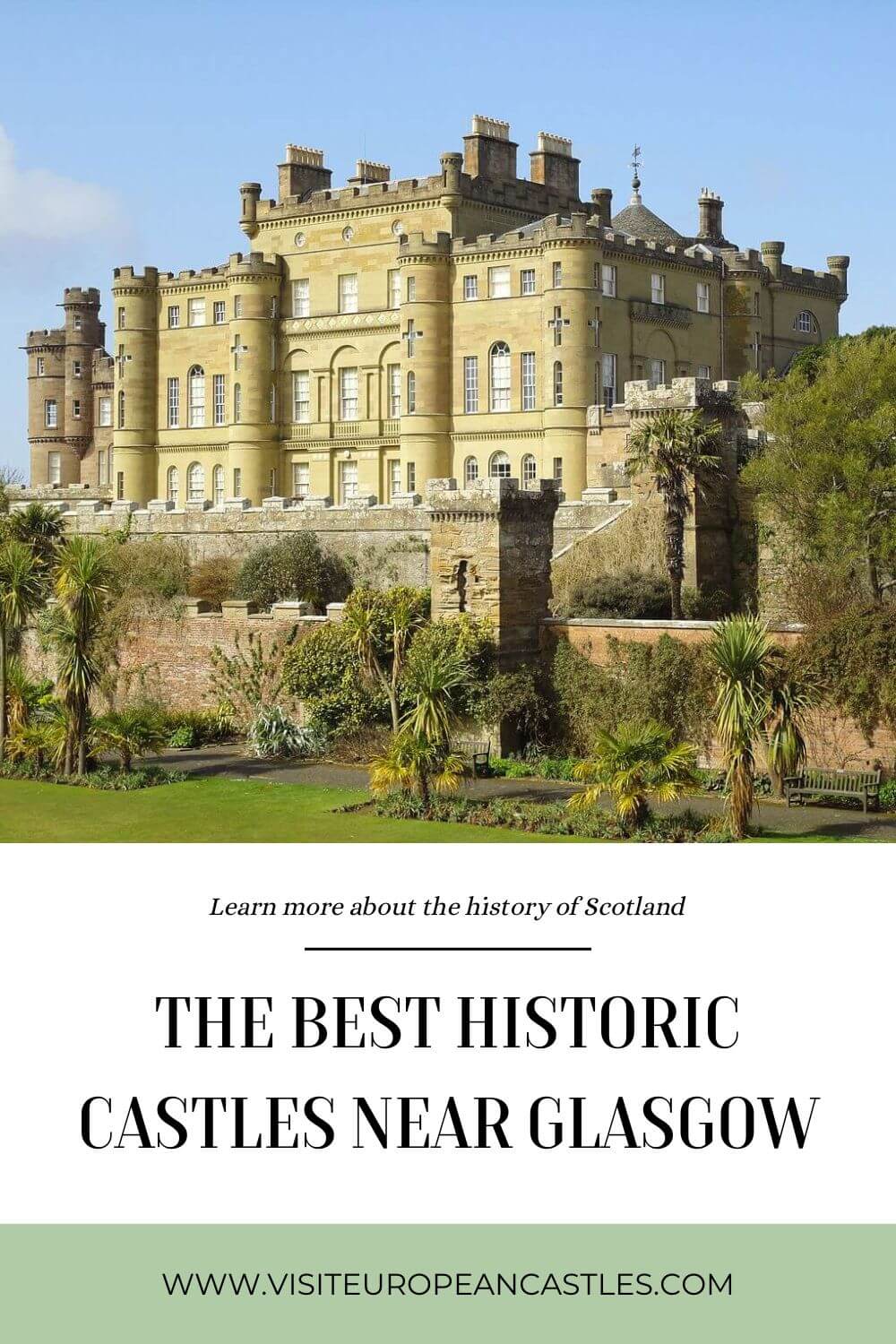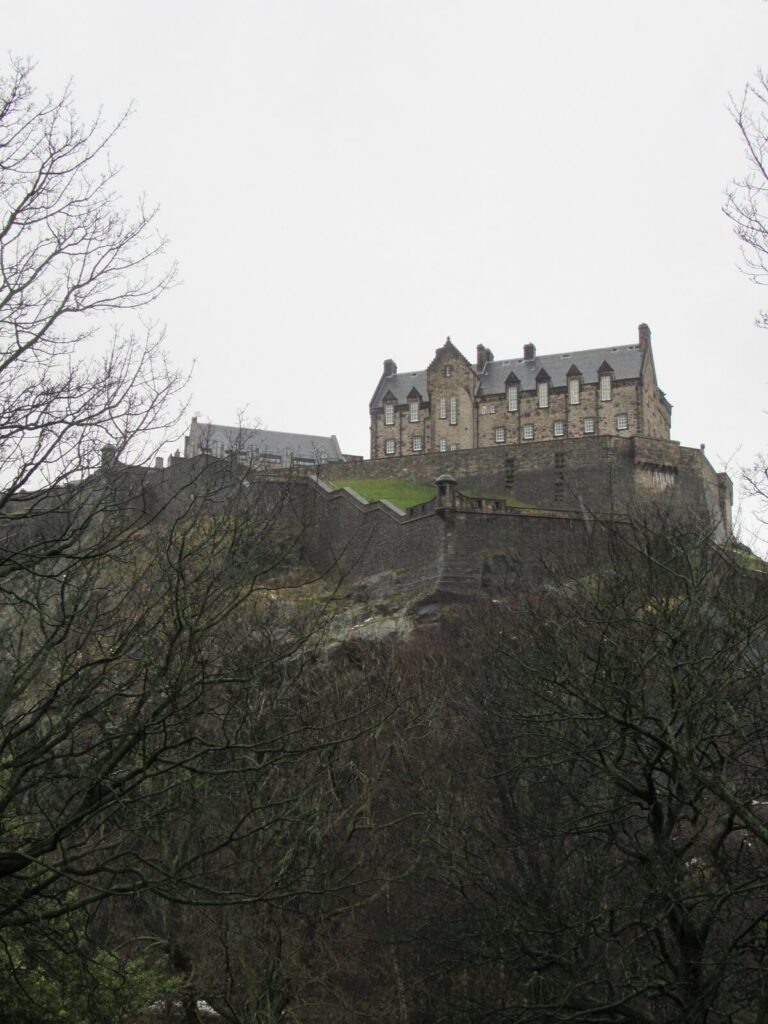The Best Historic Castles near Glasgow
People make Glasgow, but you can also say that castles make Glasgow because the Glasgow area features some of the best Scottish castles.
These historic castles and manor houses have been owned or visited by the Kings and Queens of Scotland and tell the story of historic Scotland.
Visit these beautiful castles on a day trip from Glasgow and learn more about the history of Scotland. Or walk the castle grounds marvel at the Scottish nature.

Stirling Castle
Sitting atop Castle Hill, an intrusive crag that is part of the Stirling Sill geological formation, stands Stirling Castle. Stirling Castle is considered one of the largest and most important castles in Scotland. Not only is it historically an important castle but also architecturally.
The castle is located in a strategic location guarding the farthest downstream crossing of the River Forth. The castle was also used as a Scottish Royal Residence, it is the place where several Scottish Kings and Queens (like Mary, Queen of Scots in 1542) were crowned.
The castle has been under siege at least 8 times, many of these sieges happened during the Wars of Scottish Independence. In 1746, Bonnie Prince Charlie tried to take the castle but he did not succeed.
The castle is now a popular tourist attraction for the entire family. Visit the Great Hall that was built for James IV or step inside the Royal Palace. The castle also includes The Chapel Royal, The Great Kitchens, the Queen Anne Gardens, and there is a castle exhibition telling the story of this historic castle.
Where: Stirling
Built: most buildings date from 1490-1600
Visitor information: the castle is open daily. Visit the website for current opening times and more information.

Bothwell Castle
Bothwell Castle is a medieval castle located on a steep bank above a bend in the River Clyde. The castle in South Lanarkshire was constructed in the 13th century by the ancestors of Clan Murray. The castle was built to guard the strategic crossing point of the Clyde.
In the early 15th century the castle was rebuilt and enlarged.
During the Scottish Wars of Independence the castle changed hands multiple times.
The castle was abandoned in the 18th century as you can see the donjon and the Great Hall.
Where: Bothwell
Built: 13th century
Visitor information: the castle is owned by Historic Environment Scotland. You can visit the website for opening times.

Crookston Castle
Crookston Castle is a ruined medieval castle overlooking the Levern Water. The castle was built by the Stewarts of Darnley around 1400, though there are traces of an earlier 12th century castle.
The castle was once owned by the Earls and Dukes of Lennox who repaired it after a siege in 1544. The Maxwells of Pollok family restored the castle to honour the visit of Queen Victoria to Glasgow.
Crookston Castle is the largest medieval castle in Glasgow. It has also been mentioned by poets Robert Burns, William Motherwell, and Robert Tannahill. Sir Walter Scott mentions the castle in his novel “The Abbot” where he suggests that Mary, Queen of Scots watched the Battle of Langside from beneath a yew tree.
Where: Pollok, Glasgow
Built: 1400
Visitor information: The castle is open to visitors. Visit the website for current opening hours.
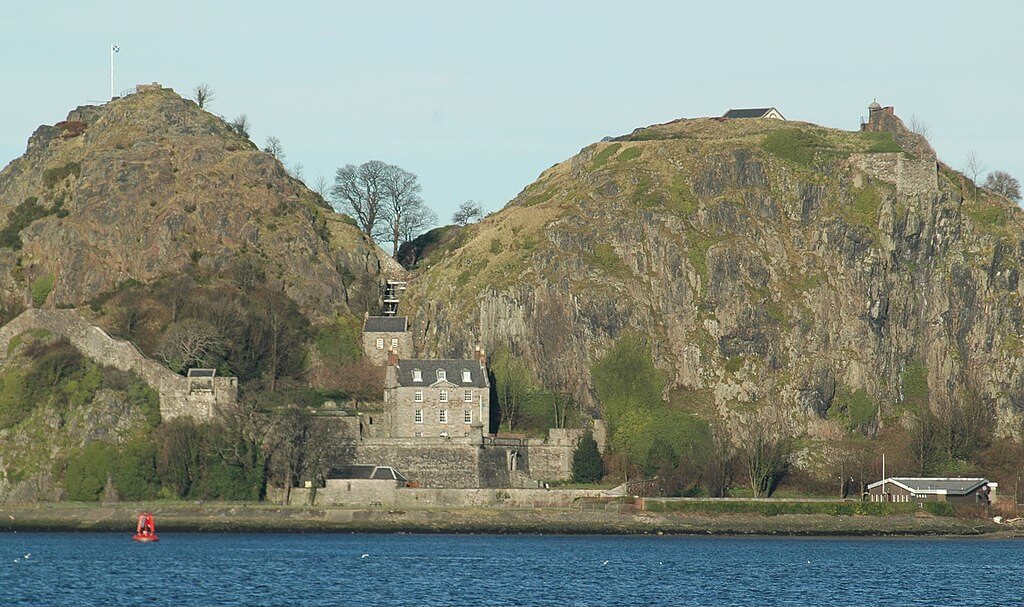
Dumbarton Castle
Dumbarton Castle sits on a volcanic plug of basalt (Dumbarton Rock) overlooking the town Dumbarton. The castle has the longest recorded history of any stronghold in Scotland.
The site on Dumbarton Rock has been a strategic important settlement since the Iron Age. In the Middle Ages, it was a Royal castle. Dumbarton Castle is believed to be the place where Sir John Menteith took William Wallace on their way to London after Wallace was captured.
It also sheltered King David II and his wife Joan of The Tower after the Scots were defeated at Halidon Hill. Mary Queen of Scots was kept at the castles for months before she sailed to France.
Where: Dumbarton
Built: since the Iron Age
Visitor information: the castle is owned by Historic Environment Scotland. Visit the website for more information.
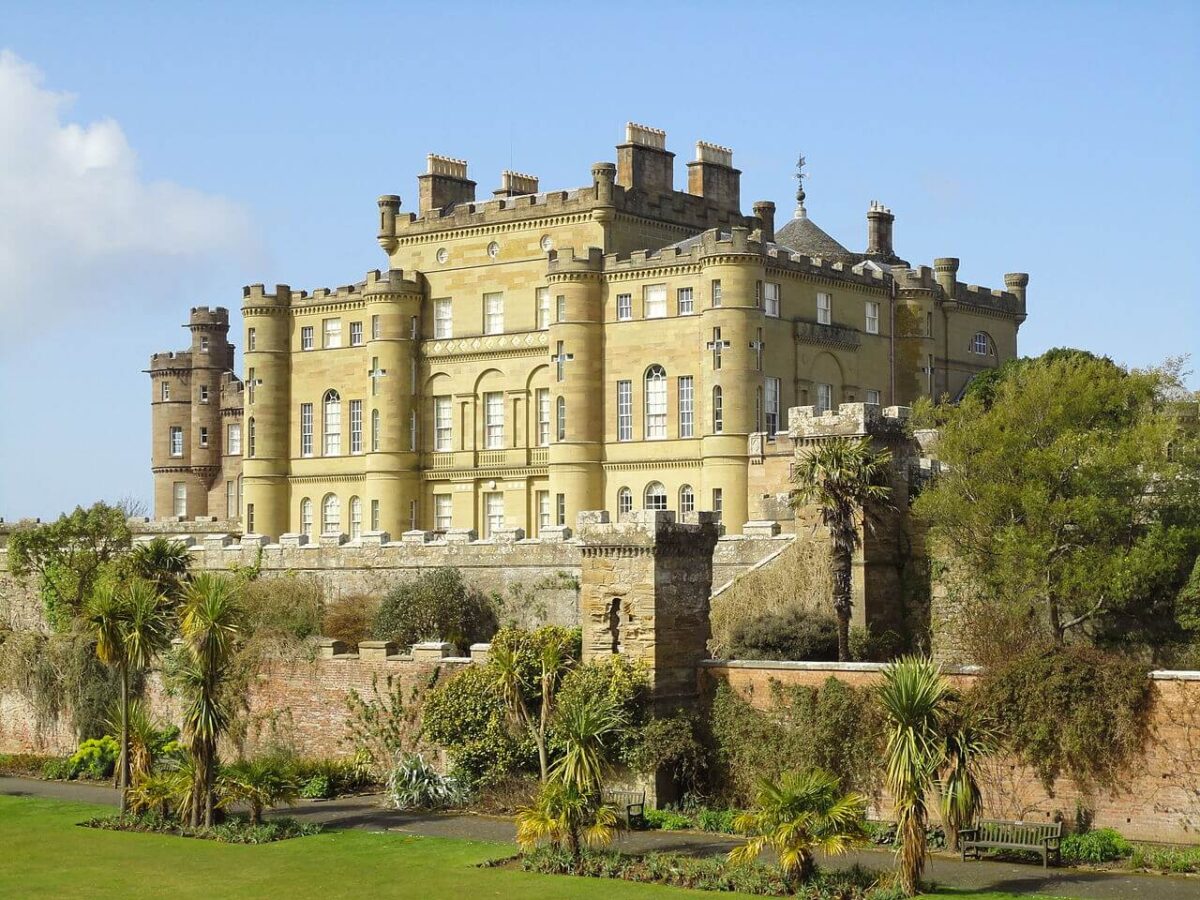
Culzean Castle
Perched on the Ayrshire cliffs stands Culzean Castle, a late 18th century country home designed by Robert Adam for the Earl of Cassilis. The country house features a large drum tower with a circular saloon inside, a grand oval staircase designed by Robert Adam, and spending apartments.
Surrounding the house is a park with a Swan Pond, formal gardens, a deer park, woods, and beaches. For children there is an Adventure Cove and a Wild Woodland paly area.
Where: Maybole
Built: 1777-1792
Visitor information: the castle and grounds are open to visitors. Visit the website for current opening hours.
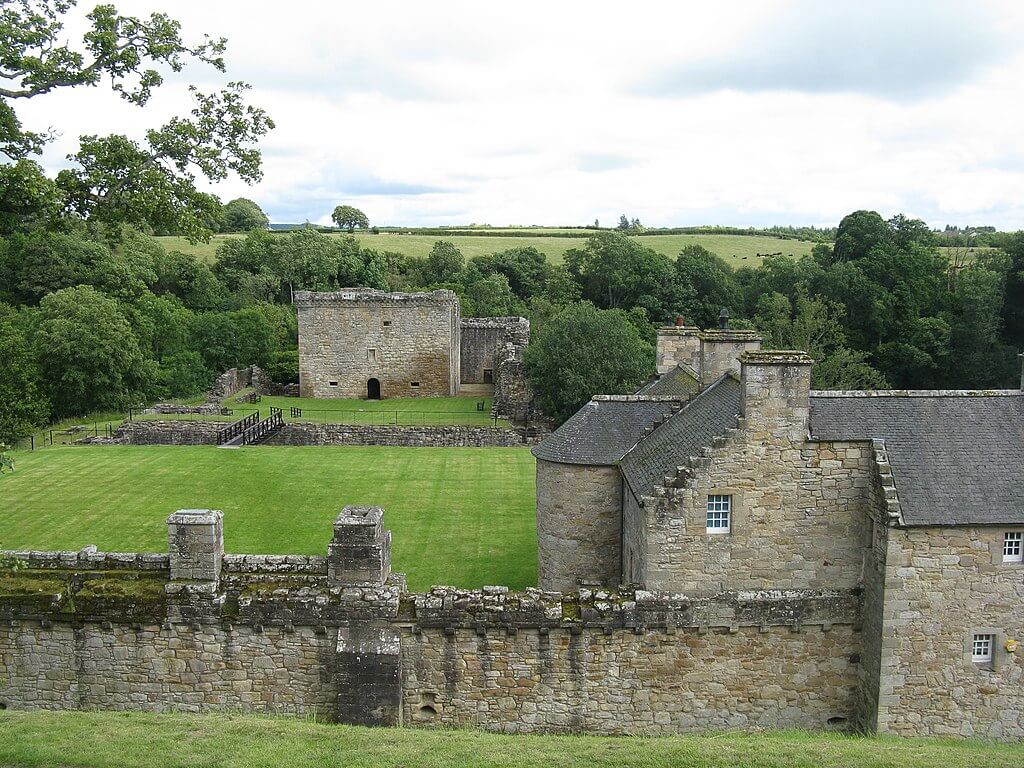
Craignethan Castle
Craignethan Castle is a ruined 16th century castle in South Lanarkshire built by James Hamilton of Finnart. The castle is located above the River Nethan and it’s considered one of the finest example of early sophisticated artillery fortification.
Though the castle is ruined there is much to see. You can visit the tower house, an exceptional “double-pile” residence, a caponier (a stone-vaulted shooting gallery), and the west rampart ruins.
When you visit the castle you should also walk through the ancient woodland of Nethan Gorge on your way to Nethan Water which is a Site of Special Scientific Interest.
Where: Crossford
Built: 16th century
Visitor information: the castle is owned by Historic Environment Scotland. Visit the website for more information.
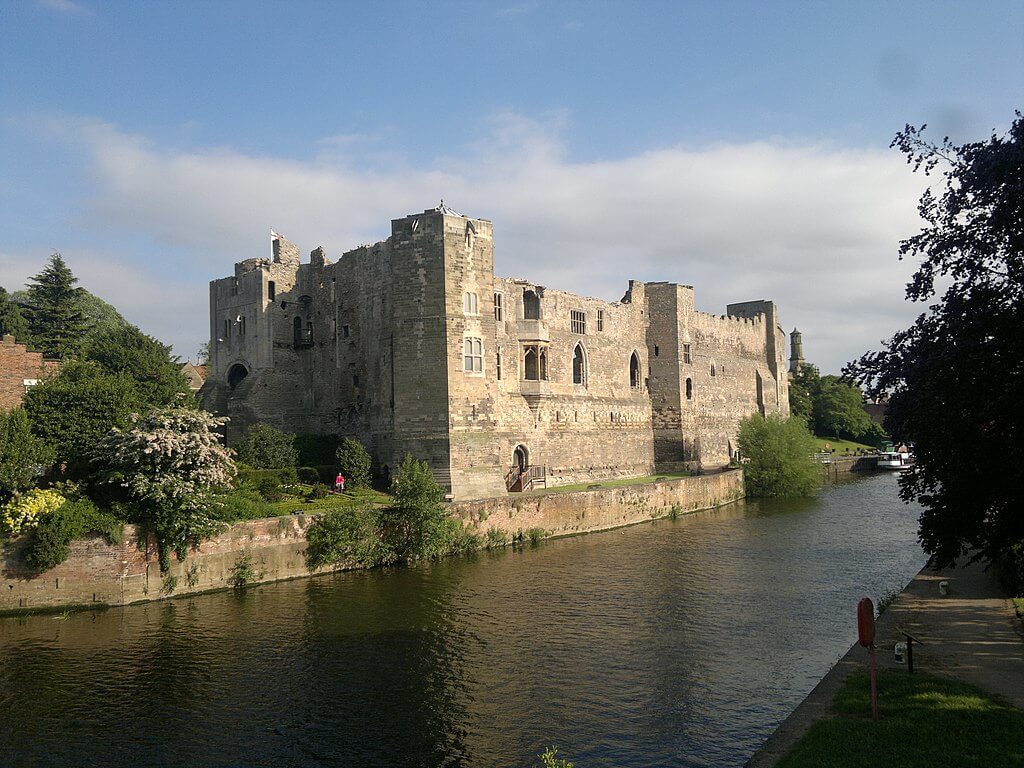
Newark Castle
Newark Castle is located on the south shore of the estuary of the River Clyde in Port Glasgow. The castle was built by George Maxwell in 1478, what remains of this castle is an outer defensive wall from one of the corner towers.
In the 16th century the castle was transformed into a Renaissance mansion by Sir Patrick Maxwell, a friend of King James VI of Scotland.
Where: Port of Glasgow
Built: 1478
Visitor information: the castle is owned by the Historic Environment Scotland. Visit the website for more information.
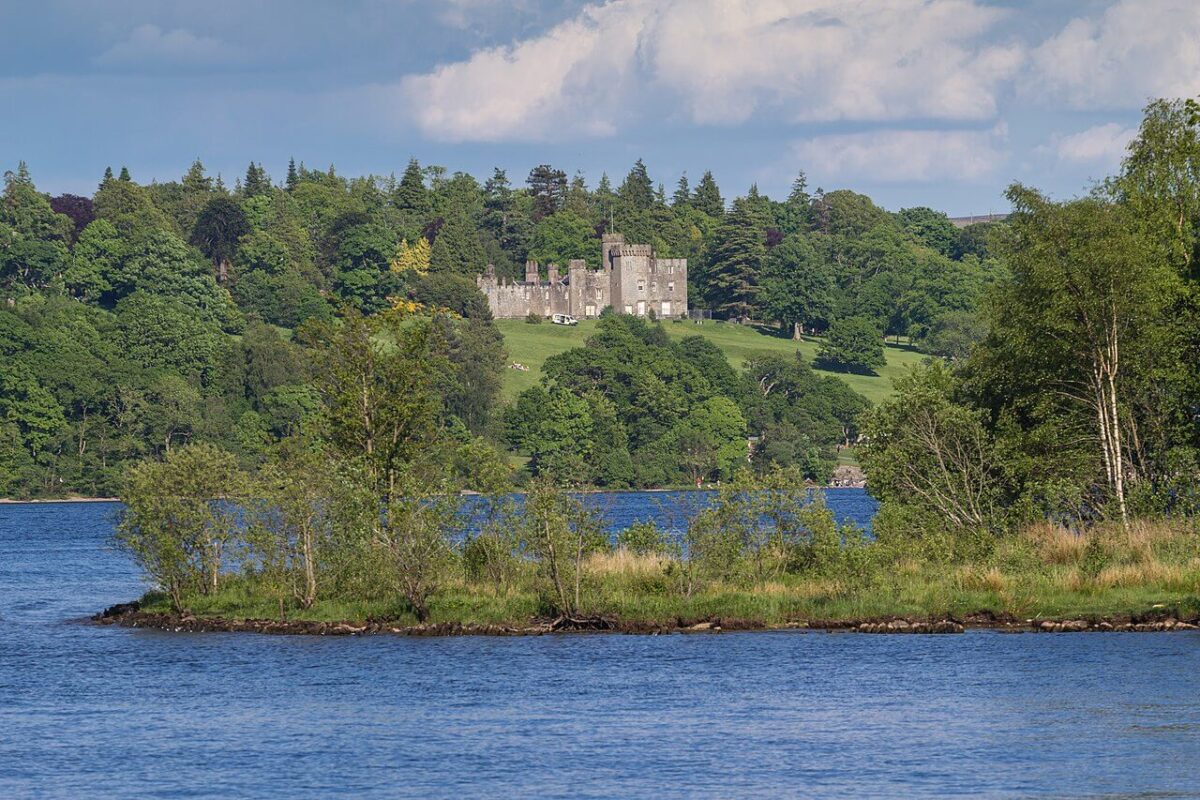
Balloch Castle
Balloch Castle is a 19th century country house at the southern end of Loch Lomond. The castle was owned by the Lennox family since the 11th century who built the old castle in the 13th century. In the 19th century, the old castle was demolished and a new castle in Tudor Gothic style was built by John Buchanan of Ardoch.
Surrounding the castle is the Balloch Country Park (Loch Lomond’s only national park) with two pleasure gardens, a Chinese garden, a Kitchen Garden, and more. From the park you also have beautiful views over Loch Lomond.
Where: Balloch
Built: 1808–1809
Style: Tudor Gothic
Visitor information: Balloch Castle Country Park is a public park.
Strathaven Castle
Strathaven Castle (also known as Avondale Castle) is a ruined 14th century castle near the center of Strathaven. Little remains of that earliest castle. It was Sir Andrew Stewart (illegitimate grandson of Murdoch Stewart, Duke of Albany) that rebuilt/built the new castle in 1457.
The castle changed hands of several Scottish noblemen like Sir James Hamilton of Finnart, James, Marquis of Hamilton, and the last resident was Anne, Duchess of Hamilton. In 1717, the castle was abandoned.
Where: Strathaven
Built: 14th century/1457
Visitor information: you can visit the castle ruins during daylight hours.
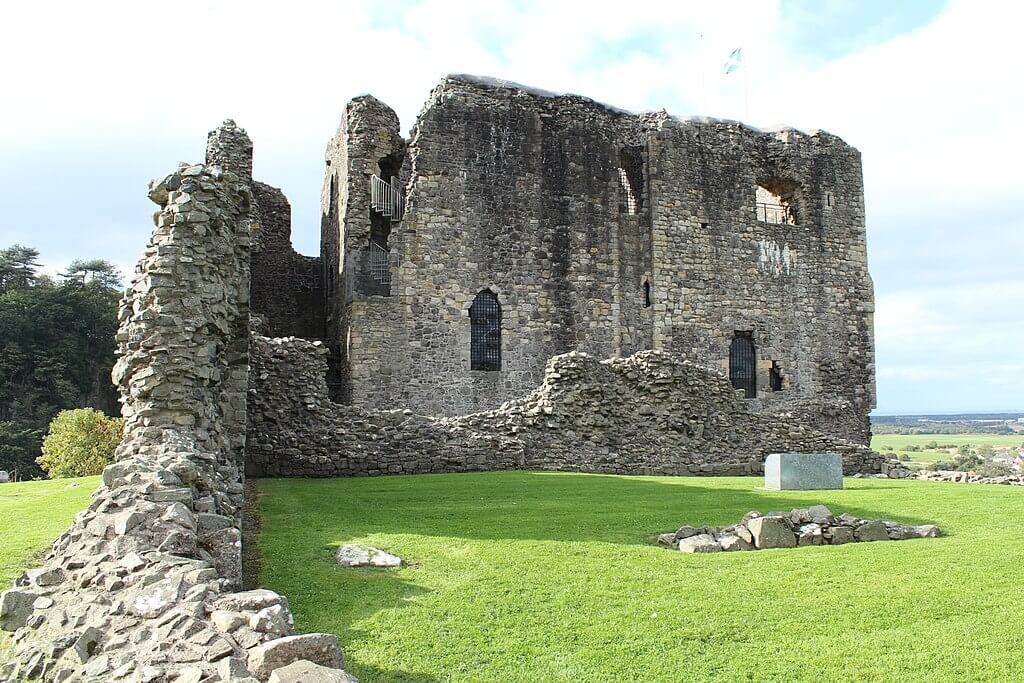
Dundonald Castle
Dundonald Castle is a 14th century fortified tower house that was used as a Royal residence by King Robert II (grandson of Robert the Bruce) and his son Robert III.
The ruined castle still boasts impressive barrel-vaulted ceilings and a spectacular coastal view. At the castle and its museum, you can hear stories and rare finds from the site’s 3500-year-old history.
Where: Dundonald
Built: 14th century
Visitor information: the castle is open daily. Visit the website for more information.
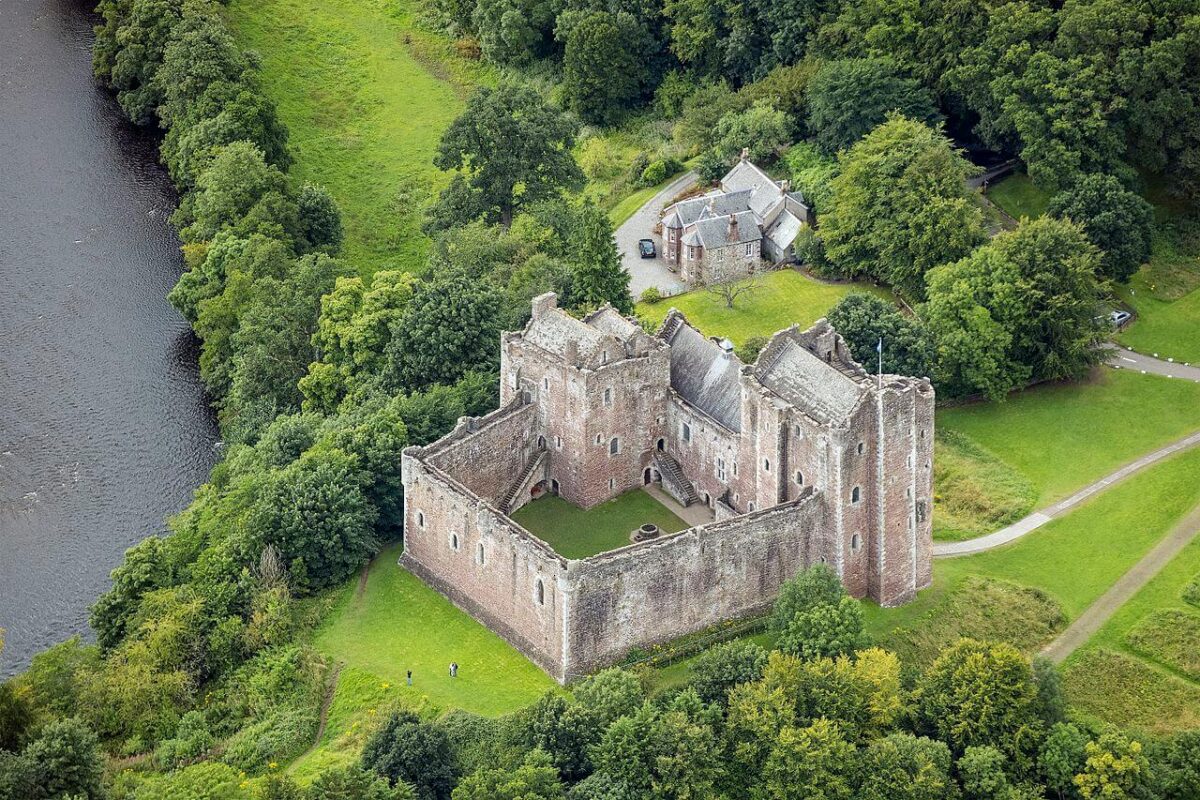
Doune Castle
Doune Castle was the seat of Robert Stewart, 1st Duke of Albany and Governor of Scotland. Also known as “Scotland’s uncrowned king” he acquired the castle in 1361.
In 1425, the castle was passed to the crown when James I executed Albany’s son Murdoch. The castle was used as a hunting lodge and a dower house. Later, the castle became the property of the Earls of Moray until it was ruined around 1800 after it saw military action during the Wars of the Tree Kingdoms, the Glencairn’s rising, and the Jacobite risings.
Though the castle is ruined you can still see Doune’s Great Hall, a cathedral-like room with a minstrels’ gallery, the Duke’s Hall, and the kitchen tower.
Doune Castle is perhaps best known as the castle in Monty Python and the Holy Grail.
Where: Doune
Built: around 1400 (with traces of an earlier castle)
Visitor information: the castle is open to visitors. Visit the website for current opening hours.
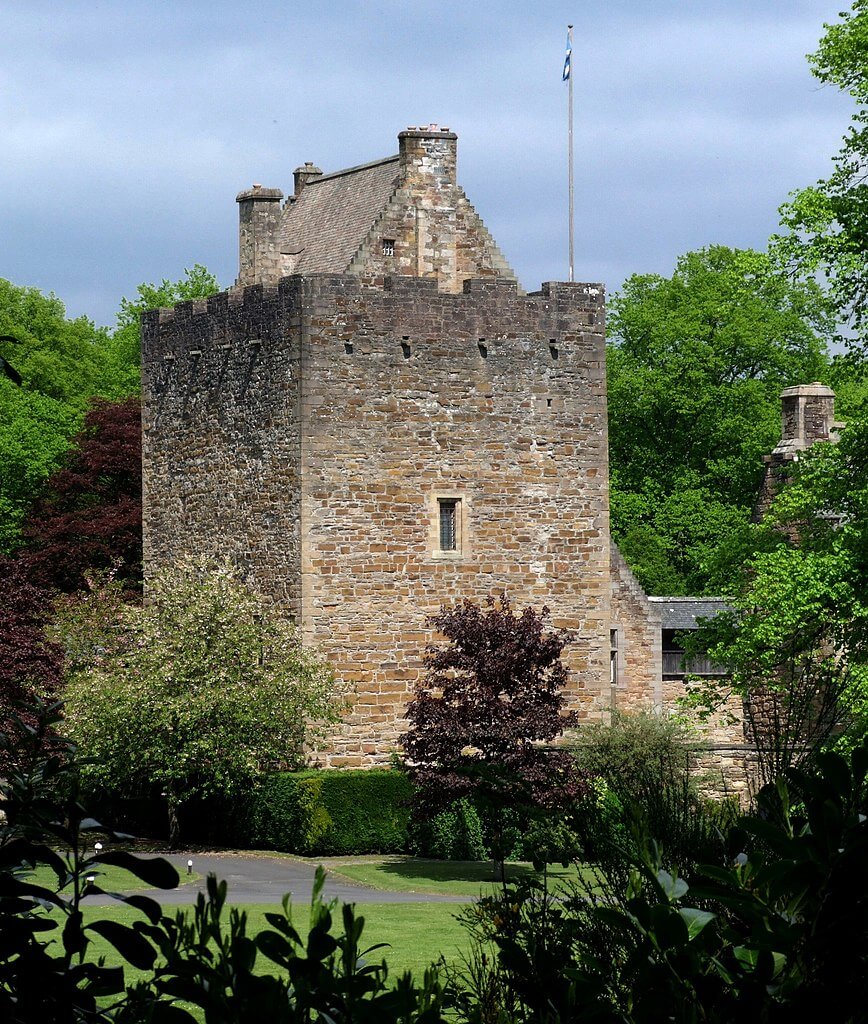
Dean Castle
Dean Castle was built as the stronghold for the Boyd family who was the lords of Kilmarnock for over 400 years. The Boyd family had a strong connection with many famous Scots. The land on which the castle stands was given to the Boyd’s by Robert the Bruce, the sister of King James III married a Boyd, and the 4th Earl of Kilmarnock joined Bonnie Prince Charlie’s rebellion.
Later residents include the Earl of Glencairn who was a patron of the poet Robert Burns.
Surrounding the castle is the 200 acres Dean Castle Country Park. Here, you can enjoy woodland walks, learn about the history of the estate, spot local wildlife, and learn more about sustainable living. For children there is an adventure playground and an Urban Farm.
Where: Kilmarnock
Built: around 1350
Visitor information: the castle and country park are open to visitors.
Cadzow Castle
Cadzow Castle is a ruined 16th century castle that was built by Sir James Hamilton of Finnart (who also built Craignethan Castle). In April 1566, James Hamilton, 3rd Earl of Arran was confined at the castle (after four years in Edinburgh Castle) for an alleged plot against Mary, Queen of Scots.
That same queen stayed at Cadzow in 1568 following her escape from Lochleven Castle. Because of that, the castle was destroyed in the late 16th century by the Earl of Mar (regent for King James VI).
Where: Hamilton
Built: 16th century
Visitor information: the castle is not open to the public as the structure is unstable. You can view the castle from the country park.

Dunure Castle
The site of Dunure Castle on the Scottish west coast dates back the the 13th century but the remains of the current castle date from the 15th and 16th century. The castle was owned by Clan Kennedy who once ruled over south western Scotland.
Mary, Queen of Scots visited the castle in August 1563 during her third progress round West Scotland. During the mid 17th century the castle fell into ruin. It is now part of the Kennedy Park.
Where: Dunure
Built: 15th-16th century
Visitor information: the park and castle are open to visitors.
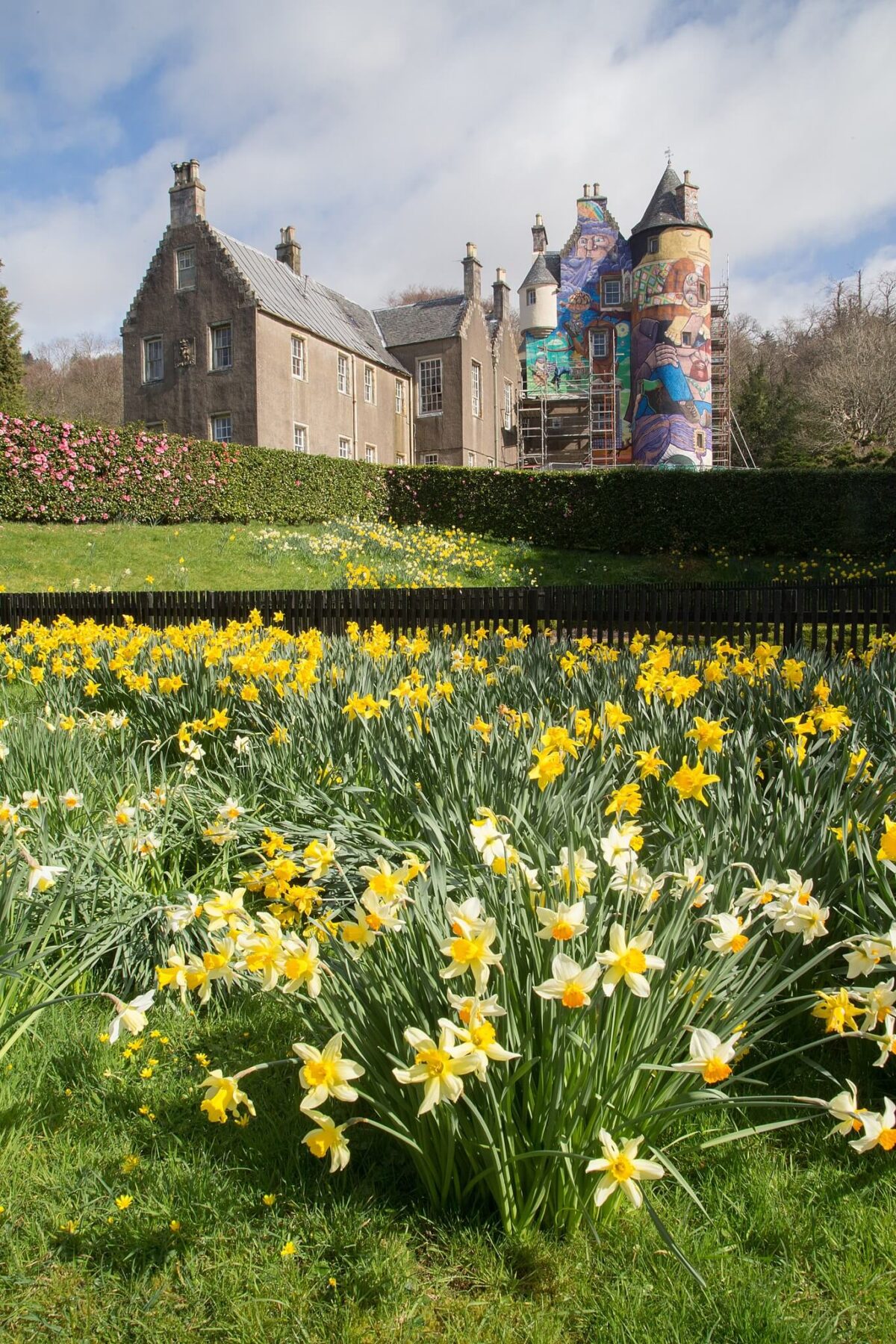
Kelburn Castle
Kelburn Castle is a large country house and the seat of the Earl of Glasgow. The oldest parts of the house date to the thirteenth century and forms the core of the current house. In 1700, the Earl extended the house and this is when it got its current French chateau appearance.
Kelburn Castle is one of the oldest castles in Scotland and it’s also the longest continuously inhabited castle by the same family.
What immediately caught your eye is the graffiti on the castle’s exterior. When the castle’s concrete facing needed replacing, Lord Glasgow invited four Brazilian graffiti artists to decorate the walls.
The castle is a fun day out for the entire family. It has a Secret Forest, a play area, and many trails and walks.
Where: Fairlie
Built: from the 16th century with multiple extensions
Visitor information: the castle is open to visitors. Visit the website for current opening hours.

Sherbrooke Castle Hotel
Sherbrooke Castle Hotel is a four star castle hotel in Glasgow. The hotel is located in a baronial villa in the south of Glasgow city.
Book your stay at Sherbrooke Castle Hotel
Glenapp Castle Hotel
Glenapp Castle is a 19th century castle designed by David Bryce for the Deputy Lord Lieutenant of the County, James Hunter.
The castle is built in Scottish Baronial style and was the family home of the Inchcape family from 1917 until the 1980s. The female pioneering aviator Elsie Mackay lived at the caste until her death in 1928 when she tried to fly the Atlantic in a single engine Stinson Detroiter.
Since 2000, the castle is a luxury five star hotel.
